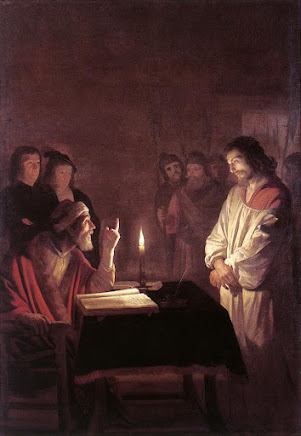(Optional Memorial of the Blessed Virgin Mary)
On Saturdays in Ordinary Time when there is no obligatory memorial, an optional memorial of the Blessed Virgin Mary is allowed.[1] Mass texts may be taken from the Common of the Blessed Virgin Mary, from a Votive Mass, or from the special collection of Masses for the Blessed Virgin Mary. Note: Suggested for this date # 24. The Blessed Virgin Mary, Seat of Wisdom
 |
| “Christ before the High Priest” by Gerrit van Honthorst, c. 1617 |
As long as in every way, whether in pretense or in truth,
Christ is being proclaimed, and in that I rejoice.
Indeed I shall continue to rejoice,
for I know that this will result in deliverance for me
through your prayers and support from the Spirit of Jesus Christ.
My eager expectation and hope
is that I shall not be put to shame in any way,
but that with all boldness, now as always,
Christ will be magnified in my body,
whether by life or by death.
For to me life is Christ, and death is gain.
If I go on living in the flesh, that means fruitful labor for me.
And I do not know which I shall choose.
I am caught between the two.
I long to depart this life and be with Christ,
for that is far better.
Yet that I remain in the flesh is more necessary for your benefit.
And this I know with confidence,
that I shall remain and continue in the service of all of you
for your progress and joy in the faith,
so that your boasting in Christ Jesus may abound on account of me
when I come to you again.
-------------------------------------------
Commentary on Phil 1:18b-26
“Paul earnestly debates his prospects of martyrdom or continued missionary labor. While he may long to depart this life and thus be with Christ, his overall and final expectation is that he will be delivered from this imprisonment and continue in the service of the Philippians and of others. In either case, Christ is central; if to live means Christ for Paul, death means to be united with Christ in a deeper sense.” [5]
-------------------------------------------
Responsorial Psalm: Psalm 42:2, 3, 5cdef
As the hind longs for the running waters,
so my soul longs for you, O God.
R. My soul is thirsting for the living God.
Athirst is my soul for God, the living God.
When shall I go and behold the face of God?
R. My soul is thirsting for the living God.
I went with the throng
and led them in procession to the house of God.
Amid loud cries of joy and thanksgiving,
with the multitude keeping festival.
R. My soul is thirsting for the living God.
-------------------------------------------
Commentary on Ps 42:2, 3, 5cdef
CCC: Ps 42:3 2112
-------------------------------------------
Gospel: Luke 14:1, 7-11
at the home of one of the leading Pharisees,
and the people there were observing him carefully.
He told a parable to those who had been invited,
noticing how they were choosing the places of honor at the table.
“When you are invited by someone to a wedding banquet,
do not recline at table in the place of honor.
A more distinguished guest than you may have been invited by him,
and the host who invited both of you may approach you and say,
‘Give your place to this man,’
and then you would proceed with embarrassment
to take the lowest place.
Rather, when you are invited,
go and take the lowest place
so that when the host comes to you he may say,
‘My friend, move up to a higher position.’
Then you will enjoy the esteem of your companions at the table.
For everyone who exalts himself will be humbled,
but the one who humbles himself will be exalted.”
-------------------------------------------
Commentary on Lk 14:1, 7-11
CCC: Lk 14:1 575, 588
-------------------------------------------
Reflection:
[1] General Norms for the Liturgical Year and the Calendar Miscellaneous Notes no. 5.
[2] The picture is “Christ before the High Priest” by Gerrit van Honthorst, c. 1617.
[3] S.S. Commemoratio
[4] The readings are taken from the New American Bible, with the exception of the psalm and its response which were developed by the International Committee for English in Liturgy (ICEL). This republication is not authorized by USCCB and is for private use only.
[5] NAB footnote on Philippians 1:19-25.
No comments:
Post a Comment